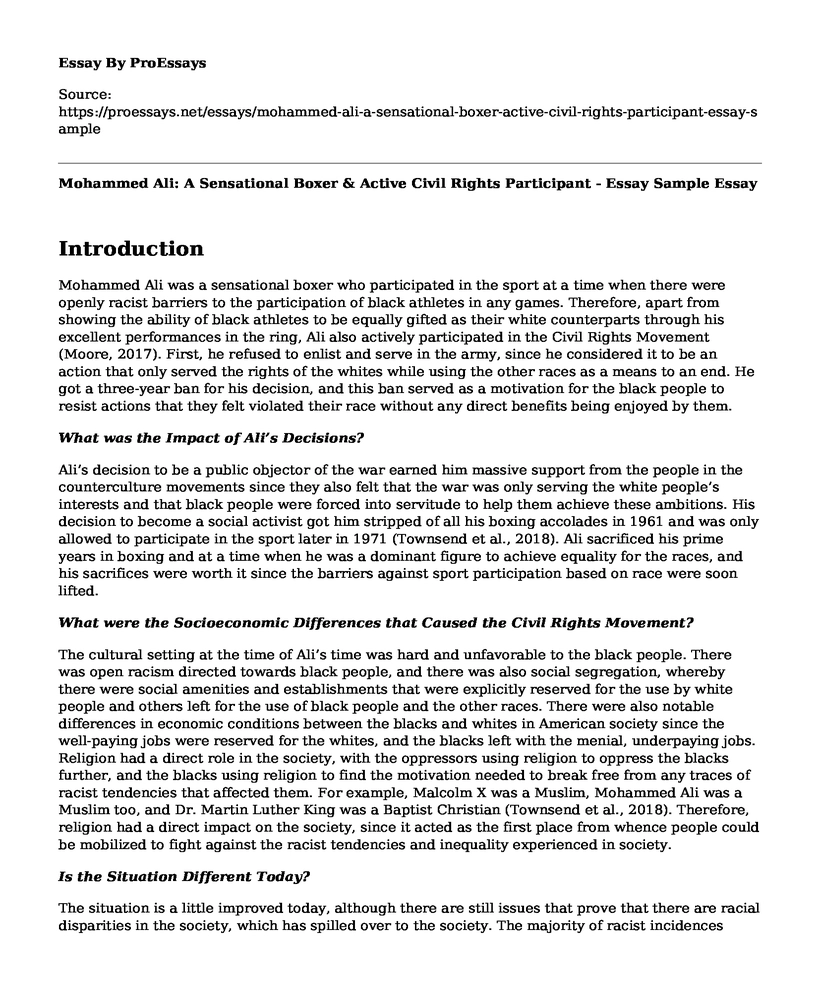Introduction
Mohammed Ali was a sensational boxer who participated in the sport at a time when there were openly racist barriers to the participation of black athletes in any games. Therefore, apart from showing the ability of black athletes to be equally gifted as their white counterparts through his excellent performances in the ring, Ali also actively participated in the Civil Rights Movement (Moore, 2017). First, he refused to enlist and serve in the army, since he considered it to be an action that only served the rights of the whites while using the other races as a means to an end. He got a three-year ban for his decision, and this ban served as a motivation for the black people to resist actions that they felt violated their race without any direct benefits being enjoyed by them.
What was the Impact of Ali’s Decisions?
Ali’s decision to be a public objector of the war earned him massive support from the people in the counterculture movements since they also felt that the war was only serving the white people’s interests and that black people were forced into servitude to help them achieve these ambitions. His decision to become a social activist got him stripped of all his boxing accolades in 1961 and was only allowed to participate in the sport later in 1971 (Townsend et al., 2018). Ali sacrificed his prime years in boxing and at a time when he was a dominant figure to achieve equality for the races, and his sacrifices were worth it since the barriers against sport participation based on race were soon lifted.
What were the Socioeconomic Differences that Caused the Civil Rights Movement?
The cultural setting at the time of Ali’s time was hard and unfavorable to the black people. There was open racism directed towards black people, and there was also social segregation, whereby there were social amenities and establishments that were explicitly reserved for the use by white people and others left for the use of black people and the other races. There were also notable differences in economic conditions between the blacks and whites in American society since the well-paying jobs were reserved for the whites, and the blacks left with the menial, underpaying jobs. Religion had a direct role in the society, with the oppressors using religion to oppress the blacks further, and the blacks using religion to find the motivation needed to break free from any traces of racist tendencies that affected them. For example, Malcolm X was a Muslim, Mohammed Ali was a Muslim too, and Dr. Martin Luther King was a Baptist Christian (Townsend et al., 2018). Therefore, religion had a direct impact on the society, since it acted as the first place from whence people could be mobilized to fight against the racist tendencies and inequality experienced in society.
Is the Situation Different Today?
The situation is a little improved today, although there are still issues that prove that there are racial disparities in the society, which has spilled over to the society. The majority of racist incidences experienced today are subtle, and the racist parties have used the excuse of misinterpretation to justify their racist actions. Black athletes have also been vocal in airing their opinions on the racism and targeting of the black community and black people through actively participating in lobby groups and movements, the most vocal one being the Black Lives Matter, which is against police brutality targeting unarmed, non-violent black people on account of their races, with the majority of these confrontations ending up with the brutal deaths of the black victims. Colin Kaepernick is one such example of a vocal example of the black athletes who protested the police brutality (Schmidt et al., 2019). He knelt instead of standing for the national anthem as a way of protest, a move that resulted in him getting released by his team, and lacking a team that would take him up to date, a trend that is the same as that one that Ali was subjected to.
References
Moore, L. (2017). We will win the day: The Civil Rights Movement, the Black athlete, and the quest for equality. ABC-CLIO.
Schmidt, S. H., Frederick, E. L., Pegoraro, A., & Spencer, T. C. (2019). An analysis of Colin Kaepernick, Megan Rapinoe, and the national anthem protests. Communication & sport, 7(5), 653-677.
Townsend, S., Phillips, M. G., & Osmond, G. (2018). Remembering the rejection of Muhammad Ali: identity, civil rights and social memory. Sport in History, 38(3), 267-288.
Cite this page
Mohammed Ali: A Sensational Boxer & Active Civil Rights Participant - Essay Sample. (2023, Aug 28). Retrieved from https://proessays.net/essays/mohammed-ali-a-sensational-boxer-active-civil-rights-participant-essay-sample
If you are the original author of this essay and no longer wish to have it published on the ProEssays website, please click below to request its removal:
- Statement of Research
- Advocating for Social Justice
- U.S. v. Sixty Acres in Etowah County Paper Example
- Social Work Intervention Paper Example
- Essay Sample on U.S. Military Fitness Decline: Poor Recruitment, Lifestyle & Mental Health
- Joseph Wesbecker: A Life of Adversity and Tragedy - Essay Sample
- My Courtroom Experience: Challenging My Timidity - Essay Sample







